K. Edwin Fritz's Blog
June 18, 2015
Why Kindle Unlimited's New Pay Structure is a Change For the Better
 eBooks: The Death of
eBooks: The Death ofPublishing As We
Know It, or the New
(Publishing) World Order? For those who missed it, the world of eBook publishing is abuzz this week over Kindle's new pay structure for books in Kindle Unlimited, its lending library. You can look up the details yourself, but the nutshell is that authors will no longer be paid an equal portion of Amazon's large monthly allowance based on # of downloads. It will now be based on how many pages of your book(s) your readers actually read.
The general consensus I've seen is one of woe & dismay as well as even more of the ever-popular "Amazon is evil!" lambasting. This is, I think, a knee-jerk reaction by inferior &/or ignorant writers. I, for one, am breathing a long-held sigh of relief.
One such example of vitriol comes from an author of short erotica who I shall not name here. In her blog post, she openly bashed Amazon for cutting her paycheck & subtly thumbed her nose at authors of bigger works. Her takeaway message was that she'd been doing well with her short books and now her heyday was coming to an end. Also, Amazon is only trying to make more money, which is both obvious & egregiously hypocritical. Of course Amazon is trying to make more money. So is she. So are we all.
But what she failed to realize in her fear for her bank account is that Amazon is also doing the publishing world a favor, one that I think will start to make up for past atrocities (namely the creation of a world where shit authors can easily publish their books alongside the Rowlings, Kings, & Martins of the world... an atrocity, mind you, which is balanced by providing legit-but-heretofore-undiscovered authors to also easily publish alongside those same greats which has been a stepping-stone for many to becoming discovered & actually making a living off of writing).
Let me put things into perspective for you...
 Too Long
Too Long(ok... not if it's really good)My novels are long. Not too long, but long enough to require an honest investment of time from my readers. They average about 400 pages (or 100,000 words for you writers out there). Each took me a very long time to write. We're talking many MANY months to draft. And more months to revise. And then still more months to polish/ re-revise/ polish again/ etc. I take pride in every word & I genuinely try to produce a high-quality product. While the jury of public opinion is still hashing out via reviews, sales, & word of mouth whether or not I've been accomplishing that monumental feat, I've regardless been getting paid the same amount per download as people who slap together a simple idea, stick on an eye-catching cover, & publish three or four (or five or ten) books in those same months.
Please understand I don't knock the value of short works... I, myself, have a couple of short story collections & even one solo short story for sale... also, some of my favorite written works of all time ("The Lottery", "The Last Question", "The Raven") are short. But I've always known that my novels (where the overwhelming bulk of my energies have gone) have been getting the shaft. It's never sat well with me to spend 8 hours at a book fair next to an author making sale after sale of a $20 children's book of maybe 40 pages & 2,000 words when I can barely get buyers for my $10/ 400-page/ 90,000-word novel. It's true that children's books are a unique genre & good parents will do anything for their kids including sacrificing their own reading desires for the betterment of their offspring, so I can happily live with the disparity there. But when I see (and I assure you, I have seen it, LOTS of times) authors deliberately publish short, low-brow drivel in order to make a quick buck from the Kindle lending library, my inner teenager-wailing-at-injustice cries out.
 The 'humph' face I make when
The 'humph' face I make whenmeeting a scam author.
Because, you see, until now it's been working.
These "authors" have not only been abusing the system by cranking out multiple books with flashy titles & covers then collecting the same dollar-per-book as novelists like me, but even worse they've also been diluting the Kindle Unlimited pool in both volume & quality.
But now, Amazon (in a cleverly-worded email to its many authors suggesting the idea came from us all along... and perhaps it really did, though I doubt it) is changing things. As I said before, authors will no longer be paid based on how many people download and read 10% of our books (the only requirement up till now). Instead, we will be paid based on pages read. This old rule of 10% was particularly harsh for authors of longer works like me. It meant that readers had to turn 35 or 40 pages rather than 10 or 12 before I got my sub-buck-and-a-half paycheck. (That's right... last month KU authors earned a whopping $1.35 for each downloaded book that was read 10% through). It also put an unnatural priority on the length of a book rather than its quality, which in my humble opinion is the bad side of capitalism. I don't know about any of you, but I'd MUCH rather spend the time to read a thousand *pages* written by Stephen King than a thousand *words* written by Stephenie Meyer.
So, yes, I am very happy Amazon is making this change.
 Happy Reader
Happy Reader
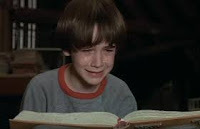 Sad Reader
Sad Reader(Ok, this is actually from "The
Neverending Story" & if you remember
correctly, the reason Bastian is crying is
because Atreyu's horse, Artax, has just
died in the Swamps of Sadness. The truth
is that this is exactly the kind of
emotional outpouring authors love).I predict that this will (eventually) encourage authors to put more effort into writing better quality books of all lengths since page turning will be the new gold standard rather than one-click wonders. Content, not mere marketing, will be a better determiner of a writer's paycheck, which is the way it used to be before eBooks changed everything. And better content means happier readers, which in turn means more readers. For everyone. After all, there is a reason indie authors have a reputation for poor quality, & this move will definitely help thin the herd.
I'm sure this sounds harsh, even greedy, but after the last few years of watching hacks steal my hard-earned money, I say good riddance to the shorty scam-artists & hello to my bigger piece of the pie. It also means poorly-written books might be downloaded but not read all the way through, and therefore not earn as much. Under Amazon's new system, it seems to me that more of the money will go to the best authors rather than the best marketers.
Do you agree? Am I out in left field on this one? I'd love to hear you thoughts in the comments.
Published on June 18, 2015 08:19
May 1, 2015
CD Story Review #11: "The Officer's Club"
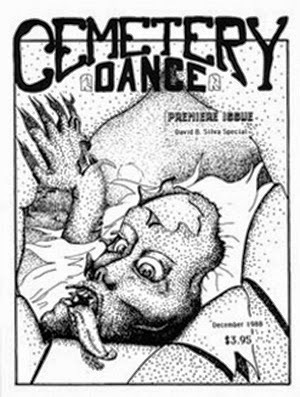 CD Issue #1THIS BLOG EXPLAINED: Richard Chizmar founded Cemetery Dance Magazine in 1988. It’s still in production today (now managed by author/ editor Brian James Freeman) & it’s considered one of the best horror mags of all time, having published and even discovered many of the genre’s most famous and successful authors. This blog series is my attempt to read, review, and research every story CD has ever printed. As of Issue #72 (January 2015), there are 540. I clearly have a long way to go.
CD Issue #1THIS BLOG EXPLAINED: Richard Chizmar founded Cemetery Dance Magazine in 1988. It’s still in production today (now managed by author/ editor Brian James Freeman) & it’s considered one of the best horror mags of all time, having published and even discovered many of the genre’s most famous and successful authors. This blog series is my attempt to read, review, and research every story CD has ever printed. As of Issue #72 (January 2015), there are 540. I clearly have a long way to go.
STORY: “The Officer’s Club”
AUTHOR: Roman A Ranieri
CD APPEARANCE: Issue #1 (Dec. 1988: VOl. 1, Iss. 1), story 11 of 12.
PLOT: Donald Wallace wakes suddenly to find himself in an all-white room. A amn is there wearing camoflague & calling him “Major Wallace”. Donald decudes he is in a military hospital, but is confused because he, too, is wearing Army fatigues even though he retired more than ten years prior. The other man then tells Wallace he is going into combat in mere minutes.
Wallace protests & complains, but the other man- whose nametag reads “PARKER” explains he is Wallace’s commanding officer, even though the chevrons on his uniform indicates he is merely a First Sergeant.
Sgt. Parker reminds Wallace of Delta Company and the battle of Kham Duc, words that instantly bring feelings of dread and remorse to Wallace. At that battle, lots of men died on Wallace’s orders. Parker then accuses Wallace of his negligence, selfishness, and uncaring of their lives, revealing that he himself was one of the victims of that battle.
Parker further explains that Wallace himself is now dead, having succumed to a massive heart attack the night before. In a fit of fear and anger, Wallace exlaims that he can’t be where he appears, that God has not yet judged him. Parker explains God has already done so, and that the memory has been wiped since no damned soul should be allowed to see the glorious, beautiful face of God an remember.
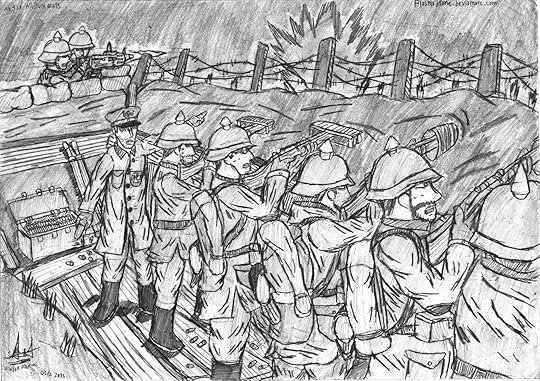 A Trench With Only One Officer
A Trench With Only One OfficerSuddenly, the white room is gone and in exchange Wallace finds himself standing in a deep trench of red rock and sandy soil. In the trench with him are thousands of other men. Each are soldiers. Their uniforms indicate, first, that they are from many countries all around the worlds and, second, that they are also from many different time periods and historic battles. Last of all, Wallace realizes each of the men in uniform are also all officers. “Sort of like the ultimate Officer’s Club. Eh, Major?” Parker says. And before Wallace can respond, a whistle sounds from an unseen location and suddenly the thousands of uniformed, dead officers are all running and climbing out of the trench. Each is followed & pushed by a lower-ranking, dead soldier like Sgt. Parker.
Immediately upon entering the battlefield Wallace is shot in the hand. The pain and surprise is immense. He sees the approaching opposing army is made entirely of demons. In their horrible hands is carried every weapon of past, present, and future imaginable.
Wallace steps on a mine. His calf and leg muscles are ripped from his leg, yet he somehow keeps running. All the other officers around him are suffering the same fates: injured and maimed, they all continue to run.
A Nazi Colonel next to Wallace is engulfed in flames & Wallace’s shirt and the skin of his chest and stomach are soon burning and charring.
The armies meet. A giant bat-demon uses a samurai sword to hack off Wallace’s right arm at the shoulder. Wallace finally stops running & falls to the ground. The bat-demon raises the sword and cuts Wallace in two. Only then does the battlefield and his pain begin to ebb away.
Major Donald Wallace wakes to Parker’s voice. He is again standing in the trench. The story ends with the line, “From somewhere unseen, the whistle blew.”
MY REVIEW: 4 out of 5 stars.
 CD Blurb on Author Roman A. RanieriWhat Ranieri did in this story was very simple: he gave us a view of hell from the perspective of the men who participated in it. The grunt soldiers (who are, it is strongly insinuated, victims of their own superiors) get their own kind of revenge by watching & commanding the officers who allowed them to die.
CD Blurb on Author Roman A. RanieriWhat Ranieri did in this story was very simple: he gave us a view of hell from the perspective of the men who participated in it. The grunt soldiers (who are, it is strongly insinuated, victims of their own superiors) get their own kind of revenge by watching & commanding the officers who allowed them to die.
What caught my attention most of all was the all-encompasing nature to the Hell Renieri created. This wasn’t just Major Donald Wallace’s story of retribution, it was the story of retribution paid to literally thousands and thousands of military men throughout all of time. Combatants from both sides of every battle ever fought are represented. This tells us that Ranieri views all war- or at least all officers of war- to be evil. He included many specifics to push this thought home… the uniforms are of British, French, German, Japanese, Russian, Australian, Italian, American, Mexican, & Spanish origins. The weapons mentioned included machine guns, rifles, flamethrowers, bows & arrows, spears, & swords. The overall picture presented is one of world-wide proportions, and it makes the overall story feel much bigger than it otherwise would have.
Another facet I liked was the personalization given to our protagonist, Major Wallace. *He* after all, is the one we witness waking to the surprise of his life. *He* is the one whose leg is destroyed in the land mine. *He* is the one who feels the anguish of pain with his many wounds and his eventual relief when he finally “dies”. And, of course, it is *he* who we watch as the final line reveals the true fate- an infinitety of suffering- that these thousands of officers will have.
This combination of seeing one man represent the many and yet seeing the many in their diversity of cultures and perspectives (the addition of the Nazi Colonel was a particularly nice touch) is a powerful one. I can only imagine how their thousands of stories are told over and over again, all so very similar even after all their centuries of hatred towards one another. It’s an entertaining message, and a good one.
Yet I could not quite give Ranieri 5 stars. The writing (ie: his ability to “turn a phrase”) was simple, even a bit lacking, and the endint to the story was predictable. Not that either of these is a knock to the overall piece. I enjoyed the story and would gladly read more of Ranieri’s writing. But I’d be lying if I said he rocked my world with this one. He gave me what I expected and hoped for, but not much more.
Regular readers of this blog know that I always try to share something I learned about the craft of writing in each of my reviews. In the case of “The Officer’s Club,” I’m struggling to do so. Yet I don’t think this is because the story fell short in any way. I think it’s because it merely followed the typical formula of what I think of as any old-school horror story… Act I: We meet a character for whom we quickly feel sorry. (Wallace is confused? Poor guy. Wallace is *dead*?! Uh-oh. This does not bode well). Act II: We learn the truth of the situation/ that character, and it’s horrible. (Wallace is in Hell, he experiences physical agony, and he totally deserves it). Act III: The horror within the story is pushed to another level & ends with a strong element of Mwuuu-Hahaha! (Wallace isn’t the only one- there are thousands more like him- and their suffering will happen over & over again). So I guess, upon more thinking, I realize now that despite my own preclivity toward telling stories that are unique or have a different perspective on well-told tales, Ranieri’s piece has reminded me that simple, even formulaic stories are still entertaining. And there’s nothing wrong with that.
 A Formula I Don't Understand
A Formula I Don't Understand
Published on May 01, 2015 16:21
April 16, 2015
CD Story Review #10: "An Island Unto Herself"
 CD Issue #1EXPLANATION:
CD Issue #1EXPLANATION:Richard Chizmar founded Cemetery Dance Magazine in 1988. It's still in production today (now managed by author/ editor Brian James Freeman) & is considered one of the best horror mags of all time, having published and even discovered many of the genre's most famous and successful authors. This blog series is my attempt to read, review, and research every story CD has ever printed. As of Issue #72 (January 2015), there are 540. I clearly have a long way to go.
STORY: "An Island Unto Herself"
AUTHOR: Barry Hoffman
CD APPEARANCE: Issue #1 (Dec. 1988: Vol. 1, Iss. 1), story 10 of 12
PLOT: Donna is upset that none of her pen pals have written back to her lately. Then, in a long (roughly 2/3 of the story) flashback, she remembers the events surrounding her first pen pal, Sandra...
Donna was in 6th grade & she was a loser: she was chubby, plain, not terribly intelligent, spoke with a lisp, wore dowdy clothes, was the subject of "four-eyes" jokes, and hid (and sweated) under a heavy winter coat all through fall, winter, & spring. To top off the list, her father was gone & her mother was an abusive drunk. She is so different she is utterly alone, an island unto herself.
Then one day her teacher announced a pen pal program, and while the other students groaned at the additional work, Donna delighted at the prospect of making a new friend who could not prejudge her.
Donna's assigned pen pal is a girl named Sandra, and that night Donna pours her heart out in seven full pages of hope-laden scribble, then secretly mailed it while her mother was passed out in front of the tv. Next came the long and worrying wait for a possible reply.
Days go by & Donna's classmates begin to excitedly tell of their return letters. But despite her heartbreak, Donna holds out hope that Sandra is taking more time b/c her response will not be as superficial & shallow as those of her classmates' pen pals.
Finally, after a full week, the letter from Sandra arrives. But Donna needs to lie to her mother about what it is so it won't be thrown away. Then she needs to do several hours of chores until her mother gets drunk enough to pass out again. When it finally happens, Donna locks herself in her room & tears open "six glorious pages!" of Sandra's reply.
Even better than the length, the content is almost as real as Donna's. While Sandra's problems were those confined to the popular crowd (The Troubles With Her Brother, The Strict Parents, and of course the ever-popular Difficulty In Choosing Which Cute Boy To Like The Most), there was none of the trite gossip (name, age, height, hair color, favorite sports, hobbies, etc.) her classmates had received.
 Look at those crazy eyes & wicked
Look at those crazy eyes & wicked smile. This may actually be Donna! Donna wrote back 5 pages, but Sandra wrote back only 2 & 1/2, some of which actually was trite this time. So Donna wrote 5 more, leading Sandy with better content in the hopes of getting a better reply. Sandy did respond in kind, but the letter took a while to receive, and the one after that took even longer. Eventually, Donna felt forced to chastise her friend for the long delays. Sandy, of course, didn't appreciate it & their correspondence abruptly ended despite Donna's multiple attempts to apologize.
Thinking all was lost, Donna spiraled into a quick & deep depression until her teacher announced another class with which they could have new pen pals. The class, however, is less enthusiastic than the first time & the teacher throws the list of names & addresses in the trash. Donna, seeing a wealth of potential new friends, steals the list & writes to 7 girls that night.
End flashback. Insert 2 brief paragraphs explaining Donna is now 32 & has been writing to multitudes of pen pals for years, sometimes to as many as 15 at once. She finds their info from fan clubs, talk shows, & classified ads.
Back to where this all started... This day, Donna receives no letters yet again & looking back she suddenly realizes it's because she's the one who hasn't been writing to them. And why is that? Because after more than 2 decades of writing her deepest feelings to strangers who temporarily filled her need for true friendship, she has finally run out of things to say.
Deciding that with nothing to say she has no reason to live, Donna gets in her car & drives at higher & higher speeds with the intention of killing herself. But at the last second she cannot. She screams inside her locked car, but of course no one hears. Donna is as alone as she always had been, that island still very much unto herself.
Then she sees & picks up a hitchhiker. A younger guy. They talk as she drives. They bond over stories of parental abuse. Donna pulls over. They kiss. Kissing turns to making out. Donna gets aggressive, first verbally then physically. She asks him odd questions which clearly show she is confusing the past & the present.
Soon she is calling herself "mommy" & accuses him of lying. In her mind she thinks he's "fake... just like Sandy. Just like all of them. Use me then cast me away."
Then Donna stabs him in the neck. Three times.
With a pen.
In the story's final paragraphs, Donna dumps his body, knowing nobody will see her (because nobody ever sees her), then goes home & writes a letter confessing every detail of the murder. When the same letter arrives 2 days later, Donna does not realize she mailed it to herself. She thinks it's a pen pal. She does, however, find the words in the letter exciting & fulfilling. So she grabs her pen & goes out on the "prowl" to do it again.
REVIEW: 4 out of 5 stars.
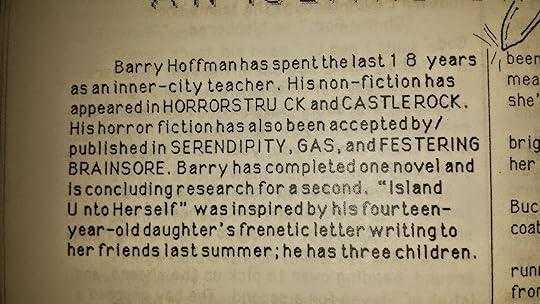 CD blurb on author Barry HoffmanFirst, let me list the reasons why this isn't a 5-star story...
CD blurb on author Barry HoffmanFirst, let me list the reasons why this isn't a 5-star story...1) There is a harsh & too-brief transition from the 10-year-old Donna to her current 32-year-old self. We get a mere 2 paragraphs before the flashback (neither of which show us she's even an adult at this stage), and then 41 paragraphs of the childhood Donna before switching back in just 2 more. It's too fast for a transition that big, making it awkward to read, hard to envision, & easy to miss more important upcoming details.
2) The seemingly-relevant relationship between Donna & her mother is left completely unfinished. Yes, Donna clearly grew into another sick version of her mom, but where mom is today & how Donna may have gotten out of that relationship is a gaping hole in their story. If it wasn't important to finish that story, why bother showing us 5 paragraphs of their interactions? It would have been enough to know she was abused & leave it at that. What's more, neither of the two critical details that shows us she's turned into her mother ("calling the hitchhiker a 'bad boy' & calling herself 'mommy') were things her actual mother actually said. Had these words/ details been specific holdovers from her own years of abuse, then those aforementioned interactions would have held more weight.
3) The timely arrival of the hitchhiker was quite contrived. The story did need a catalyst to drive Donna over the brink of insanity, but an unknown stranger willing to hop in her car and have sex at that moment is simply too perfect, and therefore lame.
4) Grammatically, there are several improper (excessive) uses of the comma. Example: "And, Sandy, was getting pissed with Donna's demands to write more often." These were just distracting enough to pull me out of the story for a moment, which is the cardinal sin of any typo.
 The Cool Pic Heading this Story's First PageAnd now, the reasons why it isn't just 3 stars...
The Cool Pic Heading this Story's First PageAnd now, the reasons why it isn't just 3 stars...1) Hoffman actually hooked me before the end of the first page. Why? Because he managed to paint the picture of a childhood loser w/out having to resort to listing the necessary characteristics as I did in my description. Instead, he worked them in gradually, piece by piece. In one sentence he mentioned Donna had "only one friend". In another, he showed the other kids calling her names. In the next, we learn her clothes are wrong and her home life is shit. The characterization was a subtle growth rather than a violent belch of factoids. For this reason, Donna's character is a believable one. I saw her as a real person, one I could both pity and with which I could empathize. I liked her, even though I suspected she would be trouble.
2) The ending wasn't just solid, it was fantastic. I mean, truly, truly excellent. Did I see her murder of the hitchhiker coming? Only about a half-sentence before it actually came. By then I was too deep into the pathetic elements of who Donna had always been, thanks to that great character-writing. Did I even realize she'd used a pen to do the deed? Honestly, I read right past it. Picking up a pen from the armrest of your car is such a natural thing. I was busy feeling icky at the gross sexual appetite of Donna & her desperate stranger. But when I back-tracked & realized what Hoffman had done, I smiled & nodded my appreciation, instantly forgetting about the typos and the other plot misfortunes. And did I think it was over when she dumped the body? I did. Which means her ill-fated last letter written to herself which would later be received & read with fresh eyes was a fresh perspective for me. I had thought she was a character who simply cracked after twenty years of bottling pain. Then the letter comes & she goes out looking for more and I suddenly realize she's not just a one-day wacko, she's a legit serial killer. And I got to see the birth, growth, and maturation of it all. What a great final concept to leave in my head as I close the magazine & try to go on with my real life. Truth is, I couldn't do it. Not for several minutes. And isn't that what we all strive to do when we read great fiction: to step away from the real world for a while? I believe it is, and I believe Hoffman nailed that most critical part of being a storyteller.
FINAL THOUGHTS:
Two things come to mind on this one. First, Barry Hoffman did make a few mistakes, but where it truly mattered everything clicked. Without reading his other works (both pre- and post- "Island Unto"), it would be unfair of me to say he was probably a younger author with true talent who was still learning the ropes. It's entirely possible he'd been writing for twenty years at that point and this was the highlight of his career. Equally possible: he had spent the better part of his 8 years as a teacher actually doing his day job & had only recently picked up paper and pen. I would believe either one. But what I can take away from this juxtaposition of talent & ignorance is that tried & true statement describing the employees of all professions: everybody has their own skills and their own weaknesses. Hoffman's skills easily surpassed his faults in this one, and I was happy the Cemetery Dance crew (oh wait... there was no crew back in '88... just Richard Chizmar all by himself) found & published this one.
The other thought floating around in my head is that this story wouldn't work today. And it has nothing to do with Barry Hoffman's abilities or style. It's simply that the whole pen pal concept is dated and no longer relevant to today's society. Do elementary schools still do pen pal swaps? I bet they probably do, but to what end? The original idea was to learn about other cultures & places, but this is an entirely moot point in a society where literally the entire cosmos is at our fingertips. Kids these days are exposed to more examples of remote villages and strange governments of the world than we 40-somethings would have hoped to learn before graduating high school. Hell, before graduating college. So would this story even work in a modern setting? The story's prominent message is, I think, that social outcasts never learn the necessary coping skills to deal with life's hardest moments, and sometimes that is a recipe for disaster. Certainly this is still a true statement and relevant to children today. In fact, it is perhaps even more relevant than ever with their tendency to make online "friends" who have no faces or voices & can go away with amazing speeds and a frightening lack of emotional pull.
If you will allow me a slight tangent, I am reminded of my own recent dealings with poor reviews for my novel, "Man Hunt". Very quickly... I had a really big sale, paid for some great advertising, and sold LOTS of copies... then in the first 5 days I received a shocking collection of 1-star reviews. And they were mean too. Unjustifiably so. Suspiciously so. 'Trolls?' I thought. Perhaps. But perhaps not, and that's my point here. Now no writer likes to received poor reviews, and every writer knows not to get caught in that web of spiraling muck by contacting stalking the perpetrators of such evil. But of course we're only human ourselves, and I've come to believe that unless I become a truly big name in writing fiction, the best I can do is to minimize my interactions with said trollish subhumans. So, yes, I looked at their Amazon profiles & other reviews. All of them. And do you know what I found? Normal human behavior, nothing more. They posted good reviews & bad. They wrote about lots of books, but also lots of other products. They were people, in other words, voicing their honest opinions, not immature 'trolls' out for a good time. Which (finally) turns me back to my point... why the hell are people online so cruel? My answer: because the internet has no face. You see, it's a thousand times harder to say something mean to a human face than it is to a handful of letters on a screen. Even my own opening analysis of Hoffman's story is certainly harsher than I'd ever say to his face if I'd ever meet him. But barring a zombie apocalypse (something which I'm not entirely opposed to, by the way :D ), the internet is here to stay. Which means that pen pals are a thing of the past, and hurtful reviews and facebook comments are likely to be even worse in the future. So how do we combat this inevitable disaster? (Don't say zombie apocalypse). In my humble opinion, it's simple: we take pains to seek out more faces. Get out of the house. Get under the sun. This is the reason I go to book signings (both my own & others') & the reason I always tell the restaurant manager when an employee is particularly nice... because we humans are social creatures. We are not meant to be islands unto ourselves. Hoffman got that one right. It's another takeaway from this story. One that I hope you agree with.
If not, I guess there's always zombies.
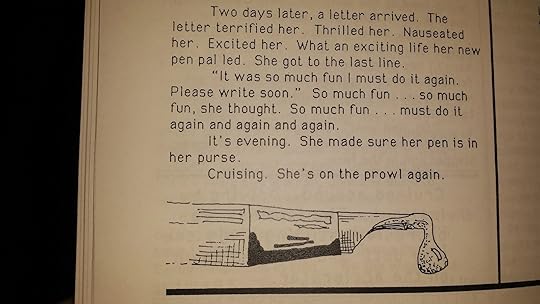 Final Image Offered By CD At the Very End of Hoffman's Story
Final Image Offered By CD At the Very End of Hoffman's StoryNICE.
BRAG BOX:
Totally unrelated to Hoffman's story is this exciting news...
After 7 years scouring the internet & opening literally thousands of For Sale links for the final 2 issues I needed to complete my CD collection, two weeks ago I hit paydirt. On Feb. 22nd, I opened yet another auto-notification for an item selling on ebay matching my search criteria. And there it was, Issue #7. I bought it for the low, low (no, VERY low) price of $5. (Full Disclosure: I actually spent $10.51 for the listing, but it came with another issue which I already owned. When I got them, I re-sold the extra issue for $5, leaving my cost at barely more than the original cover price.)
Then, just 2 weeks later on March 8th, I opened another, completely unrelated ebay auto-notification & found myself staring at the illusive Issue #6. This one is truly a rare find. I believe that only 1,000 issues had been printed of this one (unlike the ~10k of issues 4, 5, 7, 8, & 9... or so I've read on the interwebs somewhere). It is as rare as Issue #1. I bought it for $48, despite the eager sniping attempt of 2 would-be ebay trolls. But I out-smarted them, having put in my ultra-high bid from the beginning. I don't know if the e-troll knew what he was looking at. I did. It was the first time I've ever seen one for sale, anywhere, and I wasn't going to lose out.
It is with great satisfaction I can therefore announce... I have completed my collection of Cemetery Dance Magazine. I own them all.
Now then... I should really get reading & reviewing!!! :D
Published on April 16, 2015 21:23
December 16, 2014
CD Story Review #9: "The Janitor"
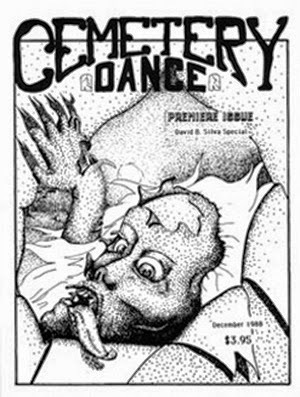 CD Issue #1Yes, yes. I've been away from this for far too long.
CD Issue #1Yes, yes. I've been away from this for far too long. Why? Writing. Advertising. Teaching.
Blah blah blah. I'm back, so read on...
Richard Chizmar founded Cemetery Dance Magazine in 1988. It’s still in production today (now managed by author/ editor Brian James Freeman) & is considered one of the best horror mags of all time, having published and even discovered many of the genre's most famous and successful authors. This blog series is my attempt to read, review, and research every story CD has ever printed. As of Issue #71 (May. 2014), there are more than 530.
STORY: “The Janitor”
AUTHOR: Bentley Little
CD APPEARANCE: Issue #1 (Dec. 1988: Vol. 1, Iss. 1), story 9 of 12
PLOT:Steven is the new kid at his elementary school and the playground is filled with other happy children, but all he wants is to lay low and avoid making enemies. He succeeds in this, however when he turns to go inside he runs into the janitor, a man that looks like a pig and smiles too widely, and Steven immediately doesn't like him. Inside, Steven observes several watercolor paintings on the bulletin board. One of them is a green monster with pointed teeth, pushing a broom, and with the same ring of grey hair as the janitor.
A nerdy kid named Timmy Turner sees him admiring it and claims ownership. Timmy is missing several teeth, and through the window Steven sees the janitor watching the two of them while fingering his necklace made of teeth.
In class, the teacher asks who wants to take the erasers to the janitor to get them cleaned. Nobody volunteers. Eventually, a kid named Eddie Trerise gets pegged for the job, but by lunchtime Eddie hasn't returned.
Steven & Timmy sit together at lunch, and Steven is surprised to find the food is not so bad. Timmy explains that the janitor is just as horrible as he looks. He claims the janitor stole Timmy's teeth and suggests that the two boys with broken arms and the two girls with limps are other victims of his abuse.
After lunch the teacher announces that Eddie Trerise had to go home sick, then asks for a volunteer to retrieve the erasers from the janitor's workroom. This time Steven gets chosen. When he gets there, the janitor leads him to a much larger, back room of the workroom. In that back room Steven finds precisely what we expect to find: a horrorshow in the form of a butcher's workshop. Teeth necklaces hang from the walls, scalps hang from the ceiling, mason jars are filled with "red and squishy things", and the centerpiece of it all is a big chopping block in the middle of the room still wet with blood. On it is a piece of Eddie Trerise's shirt.
Steven screams. The janitor laughs.
Steven threatens to tell his parents. The janitor tells him his parents don't give a shit about him & that he is living with his trampy mom & his dad left them & lives in Oregon.
Steven is shocked by this accurate description, but fights back anyway. The janitor hardly notices, easily pinning him down, and picks up a pair of long shears before asking which Steven is more important to him... his little finger or his toe.
Steven manages to kick him, sending him off balance, which opens the opportunity to smash a mason jar over the old man's head. Except it does nothing. It doesn't even break the janitor's skin. Instead, the janitor explains that Steven has been a bad boy and must be properly punished.
The next day at lunch, Timmy Turney thinks the lunch that day is the best they'd had in a long time.
REVIEW: 3 out of 5 stars.
Before explaining myself, it's important to first note the following details about the name "Bentley Little":
1) I've heard many great things about Bentley Little over the years, and I'm embarrassed to say I've never read any of his novels. (He IS on my To Read list)
2) Little became a favored Cemetery Dance contributor over the years.
3) The little blurb offered by CD in this issue alludes to the fact that Little was already becoming a well-known name in horror, even as early as 1988.
4) Little was the winner of the Bram Stoker award for Best First Novel ("The Revelation", 1990) & was nominated for the Bram Stoker Best Novel of the Year ("The Summoning", 1993).
5) Little has written more than 20 novels in the past two decades, and is high on the list of respected horror novelists.
 CD Blurb about author Bentley LittleWhen you put all that together, I think it's pretty obvious I was really looking forward to this story. Sadly, I was greatly disappointed.
CD Blurb about author Bentley LittleWhen you put all that together, I think it's pretty obvious I was really looking forward to this story. Sadly, I was greatly disappointed.The story is classic horror, this time of the psychological kind, but it is woefully simplistic in its execution. The characters are flat. The sentences are stilted and (other than the janitor's workroom scene) almost completely lacking in visual appeal. The plotline is so single-dimensional the climax was evident before the reader gets halfway.
(Why do I get the feeling that the gods of horror are about to smite me?)
The ending, though, is pretty cool. And it is perhaps that ending that saves the whole story. It's what kept it from being a 2-star story, and it's what nevertheless makes this story gut-wrenchingly nasty. What Little does do well is leave a bitter taste of unease in our mouths. School, after all, is supposed to be the one place outside of a child's home which can guarantee their safety. And while having one rogue janitor is certainly creepy, knowing that the entire school is in on it (enough to serve kids up for lunch!) takes it to a whole new level.
What is most intriguing to me about this story, however, is the TIMING of it. Little was presumably writing his award-winning novel, "The Revelation" at almost the exact same time this story was published ("Revelation" was published slightly more than a year after this one, and with edits, rewrites, & the slower pace of the publishing world back then, the timeline seems to fit very nicely). Whether the exact months match or not is irrelevant. The same Bentley Little that wrote an award-winning novel is- at the heart of it- the same Bentley Little that wrote this... well, this plainly sophomoric tale.
 It's not that I'm trying to say "While he didn't quite nail it with this piece, I can nevertheless see the great
It's not that I'm trying to say "While he didn't quite nail it with this piece, I can nevertheless see the great writer he would one day become". The point here is that he proves in another, simultaneous piece that he DOES have the chops to write great horror, and yet this one was completely lackluster. I guess what I've learned from this reading experience is that it's an illustration of that age-old saying: You can't win 'em all. If I keep this in mind, maybe... juuuuuust maybe next time I write a relative stinker of my own I won't let it get me down. (Fat chance).
I'd love to hear your comments if you have any. Thanks. :)
Published on December 16, 2014 20:24
August 7, 2014
Flash Fiction Story Request
The following flash fiction story was requested by one of my former students (hi Aubrey!) for a unique & fun-sounding huge scavenger hunt. My instructions were to include a guy named Misha, the Queen of England, an elopus (an elephant/ octopus hybrid animal) and that my maximum word count was a mere 140 words.
The following is what I came up with. Enjoy!
"Misha and Queen"
K. Edwin Fritz
One upon a time there was a jester named Misha who was the greatest juggler and actor in all of England. When he was summoned to perform for the Queen, however, Misha was terrified, for the Queen was known to behead anyone who displeased her.
Misha practiced and practiced, and when the big day arrived he went to the castle and performed a brilliant one-man, three-act play which passionately conveyed the heartbreak of a lonely elopus who broke his 8th and favorite trunk.
The Queen was delighted, and gave him first a kiss on the forehead before beheading him anyway. "I alone should be permitted to see such perfection," she explained.
To this day the kingdom holds an annual "Misha Day" in which everyone wears elopus costumes and one unlucky soul is stabbed eight times in the neck.
THE END
The following is what I came up with. Enjoy!
"Misha and Queen"
K. Edwin Fritz
One upon a time there was a jester named Misha who was the greatest juggler and actor in all of England. When he was summoned to perform for the Queen, however, Misha was terrified, for the Queen was known to behead anyone who displeased her.
Misha practiced and practiced, and when the big day arrived he went to the castle and performed a brilliant one-man, three-act play which passionately conveyed the heartbreak of a lonely elopus who broke his 8th and favorite trunk.
The Queen was delighted, and gave him first a kiss on the forehead before beheading him anyway. "I alone should be permitted to see such perfection," she explained.
To this day the kingdom holds an annual "Misha Day" in which everyone wears elopus costumes and one unlucky soul is stabbed eight times in the neck.
THE END
Published on August 07, 2014 10:43
July 11, 2014
CD Story Review #8: The Departing of Debbie
 CD Issue #1Richard Chizmar founded Cemetery Dance Magazine in 1988. It’s still in production today (now managed by author/ editor Brian James Freeman) & is considered one of the best horror mags of all time, having published and even discovered many of the genre's most famous and successful authors. This blog series is my attempt to read, review, and research every story CD has ever printed. As of Issue #71 (May. 2014), there are more than 530.
CD Issue #1Richard Chizmar founded Cemetery Dance Magazine in 1988. It’s still in production today (now managed by author/ editor Brian James Freeman) & is considered one of the best horror mags of all time, having published and even discovered many of the genre's most famous and successful authors. This blog series is my attempt to read, review, and research every story CD has ever printed. As of Issue #71 (May. 2014), there are more than 530. STORY: “The Departing of Debbie”
AUTHOR: Anke M. Kriske
CD APPEARANCE: Issue #1 (Dec. 1988: Vol. 1, Iss. 1), story 8 of 12
PLOT:
Jim Conant has just finished a clandestine evening with his mistress. It was some rough sex, and they both liked it. The problem is that she dies immediately afterward, presumably of a heart attack.
[He's later revealed to be in his early 40s, so while a little odd, it's not impossible.]
He surveys the situation- scratches on her back & his arms, bodily fluids on the car seat, ripped clothes, a missing earring- and he realizes he'd easily be pegged as her murderer. And even if an autopsy eventually proved otherwise, his wife probably wouldn't appreciate his innocence. He decides his only course of action is to hide the body.
Conant (as the author calls him) is also a high school science teacher, and they had been having their fun parked after hours in the school's vacant lot. He quickly determines his best option is inside the school itself. Thanks to his coaching position for the track team, he has a key.
Inside his classroom, he struggles her body into the aluminum sink and gets to work. Using rubber gloves, an apron, a collection of the little knives used for the classroom frog dissections, and twenty years' experience teaching anatomy, he begins to dismantle her body piece by gruesome piece.
He starts with the skin and muscles on her back and soon moves to her internal organs. As he works, he names the various parts, feeling like one of his own students for the first time in years. It takes several hours, but with the addition of a limited amount of hydrolic acid & the cafeteria's garbage disposal, he reduces Debbie to nothing more than bones.
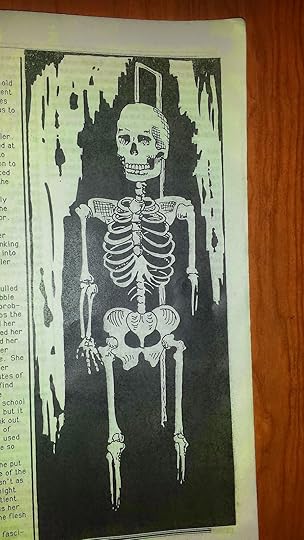 THE AWESOME PIC THAT
THE AWESOME PIC THATCOMES WITH KRISKE'S STORYAnd then comes his "crowning achievement." Conant reasons that if the best place to hide a book is in a library, the best place to hide a skeleton (no, it's not the local cemetery... his is near a highway and practically next door to the police station) is in a science classroom. Taking another few hours to accomplish the task, he arduously strings together Debbie's bones. When done, he exchanges the classroom skeleton, Clyde- who is old & who he's been asking to replace for years- with his beloved Debbie.
[The story could pretty much end there, topping out around 1,800 words, but Kriske give us so much more story in only 700 more words.]
Weeks and then months pass. Conant has gotten away with it. His students suspect nothing, his wife is none-the-wiser, and every morning he gets to have a brief chat with his old flame, often to his happy arousal.
Then, with only days before the end of the school year, tragedy hits. Another teacher presents him with a gift... a replacement skeleton for the one he's been asking to dispose of for years. The exchange, the teacher explains, has already been made. Old 'Clyde' is currently on his way to the incinerator.
Conant rushes to the boiler room just in time to prevent the janitor from destroying the collections of bones he has come to love. He screams at the mild-mannered man ("You are not to touch Debbie!") and pulls at the box containing her bones. His mind, however, is not quite entirely gone. He knows enough to let the janitor do his job and bring to an end the details of his own crime.
But the loss of Debbie pushes Jim Conant over the edge, and the story ends with him living in a mental ward. And he lives there with not one secret, but two. At the last possible moment, he stole a little part of her- a finger bone. But since the patients at the ward aren't allow to have pockets, he has kept her hidden inside his mouth.
REVIEW: 5 out of 5 stars.
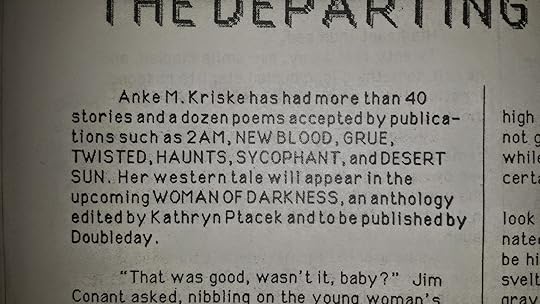 CD BLURB ON AUTHOR ANKE M. KRISKESimply put, this story rocked. It has hereby set the bar for all future 5-star stories in this blog. As a reader I was entranced from the beginning. I was shocked to shivers several times along the way. And that ending... wow! Kriske has in one fell swoop reminded me what horror can be. The first thing I did when finishing was to look her up & see what other gems might await me since I decided immediately to read more of what she has to offer.
CD BLURB ON AUTHOR ANKE M. KRISKESimply put, this story rocked. It has hereby set the bar for all future 5-star stories in this blog. As a reader I was entranced from the beginning. I was shocked to shivers several times along the way. And that ending... wow! Kriske has in one fell swoop reminded me what horror can be. The first thing I did when finishing was to look her up & see what other gems might await me since I decided immediately to read more of what she has to offer.[The results, btw, showcased one of the problems doing this blog will bring. Many of the authors in the early issues will have only been published in magazines that are now out of print. While www.isfdb.org lists a total of 21 short pieces published under her name, only 3 are actually available for sale on Amazon].
Though the vocabulary is simple, "The Departing of Debbie" is far from a simple story. It begins with an affair gone wrong. We see the confusion, the fear, and the rationalization of the primary character. Next we are given the meticulous cleaning up of the body, a thing Kriske does with fantastic detail (the scene where Conant uses a coffee spoon- "the only appropriate instrument he had handy"- to scoop out Debbie's brain from her skull is particularly nasty & memorable). Here we are given detailed gore mixed nicely with the slow undercurrent of growing insanity... Conant doesn't just name the body parts as he removes & disposes of them, he is constantly impressed with his progress as he goes. Finally, we get the twist ending which not only takes the story further than we had expected, but also gives us that great and true feel of horror as we close the magazine. For me, the story was a 5-star going into the final paragraphs. The ending was a welcomed exclamation point.
I've read plenty of getting-away-with-murder stories before. They can be entertaining, but they also sometimes leave me wondering if the author is using fiction as an outlet for deeper problems. And even if they don't, the point of these storis is almost always to showcase the cleverness of a born killer. Creepy, yes, but also somewhat ho-hum. Kriske's story is light years better than these predictable pieces. Her protagonist isn't a killer; he's a (mere) cheater and liar, a thief of his wife's devotion. Moreover, he starts the story in perfect (albeit pig-headed) sanity and works towards insanity as the story progresses.
As a writer, I was struck mostly with the story's final 700 words. But I don't mean the power of the events themselves. I'm talking about the structure of the story. Think for a moment about the standard design of a piece of fiction. It goes something like this: Character A has Problem B which forces him/her to take Actions C, D, & E until Climax F solves the problem and leaves us with Resolution G. What Kriske has done is sneak in an additional part of the narrative plotline between F & G. Call it "Climax 2.0."
When we see Conant hang Debbie's skeleton in his classroom, he has solved his problem. We suspect the final paragraphs we have yet to read are the resolution- showing how he goes on with his life- and we also suspect something will go wrong (this is, after all, a horror story). Possibly he'll get caught. Possibly Debbie's bones will come alive and strangle him to death (for a supernatural twist). Possibly he'll eye that skeleton day after day, slowly working up the courage to commit a real murder just so he can dismantle another body. And at first it seems Kriske is giving us just that. Conant gets away with it and starts to develop an unhealthy connection to Debbie's skeleton. But then, just before we get the final results of his deeds... WHAM! That awesome twist. The other teacher brings in a new skeleton, Conant fully loses his mind, and we see him in a mental ward with her finger bone hidden in his mouth for... how long?... oh, I don't know, but years it feels. Years, certainly.
It's another, higher climax than we had been expecting, and it works simultaneously as a resolution. I love what Kriske has done here, and I am certain I'm going to find a way to buy old copies of magazines her work has appeared in, if nothing more than to see if its a common theme in her stories or if this one was unique in that regard.
What I've learned from reading this is that not all stories need to follow a prescribed format. Better still, having the courage to break the mold- a little anyway- can have very powerful results. In the future, I'm going to open my mind to other ways to lead my readers to the emotional state I want them.
Published on July 11, 2014 07:33
June 25, 2014
CD Story Review #7: Rock of Ages
 THE COVER OF ISSUE #1Richard Chizmar founded Cemetery Dance Magazine in 1988. It’s still in production today (now managed by author/ editor Brian James Freeman) & is considered one of the best horror mags of all time, having published and even discovered many of the genre's most famous and successful authors. This blog series is my attempt to read, review, and research every story CD has ever printed. As of Issue #71 (May. 2014), there are more than 530.
THE COVER OF ISSUE #1Richard Chizmar founded Cemetery Dance Magazine in 1988. It’s still in production today (now managed by author/ editor Brian James Freeman) & is considered one of the best horror mags of all time, having published and even discovered many of the genre's most famous and successful authors. This blog series is my attempt to read, review, and research every story CD has ever printed. As of Issue #71 (May. 2014), there are more than 530. STORY: “Rock of Ages”
AUTHOR: John B. Rosenman
CD APPEARANCE: Issue #1 (Dec. 1988: Vol. 1, Iss. 1), story 7 of 12
PLOT: Steve Marsh is indulging in childhood nostalgia by visiting the county fair. He feels foolish for dishing out a buck fifty to visit the fun house [remember, the year is 1988], and his wife Bette is outside, waiting impatiently to 'carp' at him when he is done. But for now he is remembering when life was better.
The carnival barker pitched that Steve would see "the most frightening thing in the world" inside the fun house, and as he turns the doorknob & steps in he wonders absently what it would actually take to meet such high claims. He expects nothing more than paper mache monsters, sliding platforms, trick mirrors, and "air holes that goosed you from below".
What he sees, however, is a scene from his own past. A day from his teens when he & Bette made love for the first time. It had been outdoors. It had been hurried and clumsy. And it had been a set-up. Bette, three years his senior, had easily seduced him and told him a few days after that she'd gotten pregnant. Weeks later they were married and Steve's life of hell had begun. Except Bette hadn't been pregnant. She had lied, Steve realizes now that he is about to watch the single event that ruined his life.
In a (final?) release of all those pent-up years of frustration and hatred, Steve steps forward, flings his teenage self off of the teenage Bette, picks up a rock, and brains Bette in the face multiple times.
Moments later his visit to the past is over and he is back in the fun house. He steps outside and realizes that his wife is nowhere to be seen. Better still, a different woman, beautiful and kind-faced, seems to be smiling and waving at him. They walk towards each other, but she veers aside and greets another man. He suddenly realizes the rock is still in his hand. Then Bette makes her reappearance, changed only by the new horrific scar on her face and the ominous words: "Steve, you didn't think you had escaped me, did you?
REVIEW: 5 out of 5 stars.
As a reader, I appreciated how Rosenman shows us that just because a story is short (only 1,000 words) doesn't mean it's necessarily simple. "Rock of Ages" has so much packed into it. (Seriously, look how long my summary is. It's practically as long as the story itself!) In it we find good characterization, a great build-up to the ending, and (perhaps most importantly) actual horror. What is the scariest sight in the world? Answer: Having to re-live the worst moment of your life.
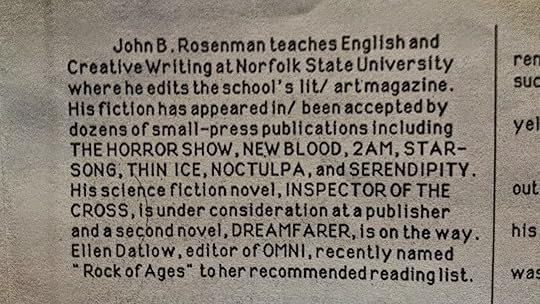 CD BLURB ON AUTHOR JOHN B. ROSENMAN
CD BLURB ON AUTHOR JOHN B. ROSENMANNot bad for a thousand words.
For a moment, let's go back to that ending. By showing the beautiful other woman, Rosenman gives us just the right touch of hope before reality comes crashing down. Twice. Even better (worse?) we are left dealing with a gruesome message too: if you're weak-minded or gullible, watch out. You're in for a world of hurt, and if you dare try to fix that world, it's only going to get worse.
The story has another advantage to which I must give an appreciative nod: Working time travel into any story that isn't primarily about time travel is just cool. I'm a big fan of that subgenre, and I've come to believe it's HARD to do it right in a short space.
I also love the title. "Rock of Ages". I see what you did there, Rosenman. You took a cliché & gave it an entirely new meaning, and a witty one at that.
As a writer, Rosenman's story reinforces that age-old rule in fiction that shorter is better. If this were a 3,000-word story, I'd give it 4 stars and explain that he dragged it on too long or over-described. But seeing the sheer depth of this piece not only warrants it's 5-star accolade, but also reminds this writer about the dangers of verbosity when brevity will do.
Published on June 25, 2014 09:16
June 10, 2014
Meet My Main Character Blog Tour
 MMMMM... SLEEEEEEPY TIIIIMESo there I was, rubbing & blinking my eyes at the tail end of a long night of reading (yay!) and finally readying myself to bed down for the night when Lilo Abernathy, author of the high-rated
The Light Who Shines
mystery/ romance/ thriller novel, tagged me in a Facebook post.
MMMMM... SLEEEEEEPY TIIIIMESo there I was, rubbing & blinking my eyes at the tail end of a long night of reading (yay!) and finally readying myself to bed down for the night when Lilo Abernathy, author of the high-rated
The Light Who Shines
mystery/ romance/ thriller novel, tagged me in a Facebook post. NO, I HAVEN'T
NO, I HAVEN'T READ THIS YET.
YES, SHAME ON ME.
Normally I ignore such taunts at 3 in the morning, but this one caught my attention. Lilo asked me to join a tour of authors blogging about their protagonists & it occurred to me that I sometimes have a difficult time explained my novel specifically because it has not 1 but 2 of them.
Very well, Lilo. CHALLENGE ACCEPTED!!
Here goes...
1) What is the name of your main character? Is he/ she fictional or a historic person?
As I said, "Man Hunt" has two protagonists. They are Josie and... er... "Obe". No, that's not a typoe, and no, he's not some kind of new monster I made up. The thing is, Obe doesn't know his real name. Because of his (unknown) indiscretions with the opposite sex, he's been tortured & brainwashed and given that name as a pathetic label meant specifically to downplay his value as a human being.
Josie was one of the women who tortured him.
Both characters are entirely fictional. (Thank God)
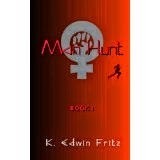 2) When and where is the story set?
2) When and where is the story set?Modern day. On a once-prosperous tourist island somewhere in the North Pacific Ocean. It has lush green hills, picturesque hundred-foot cliffs, and an abandoned city filled with warped roads, cracked concrete, and a few hundred other men who are being punished for their sexist actions.
3) What should we know about him/her?
Josie is beautiful, both inside & out. Her physical beauty is an excellent trait for all the men she seduces to the island. Her inner beauty comes in the simple fact that she has maintained the resolve to know that what they are doing there is wrong. All but the handful of women in charge are as brainwashed as the men. Josie has just enough strength and courage to contemplate change.
Meanwhile, Obe both fears and hates the women for what they've done to him, but he has yet to fully face his own crime which warranted his presence on the island. Nevertheless, he is a survivor. He was released from the fortress several months ago and runs fast and intelligently from the women who now hunt him on a daily basis.
4) What is the main conflict? What messes up his/her life?
Josie gets caught having compassion for the men.
Obe has been moved to an area of the island where more experienced men expect him to conform to their ways.
5) What is his/her personal goal?
Josie wants to feel right again. What brought her to the island six years ago was a boyfriend who date-raped her. She was young and impulsive and angry and so easily manipulated by the women who run the place. She has matured despite (or perhaps because of?) these years of taking revenge, and ultimately she'd like to see the island shut down, though she'd be satisfied with her own salvation. It doesn't appear, however, that she still believes such a thing is possible.
Obe obviously wants to survive/ go home, but his need to repair his damaged mind and reclaim his identity is a far stronger need. Specifically, he struggles to remember not only his real name, but the face of his brother... a vague memory of love from his childhood.
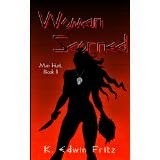 6) Is there a working title for this novel, and can we read more about it?
6) Is there a working title for this novel, and can we read more about it?Both "Man Hunt" and it's sequel, "Woman Scorned," are already published. Both can be found on My Amazon Page. I'm currently working on the final installment of this trilogy. It's called, "Battle of the Sexes."
7) When can we expect the book(s) to be published?
"Man Hunt" was published on Valentine's Day, 2013 (don't you just love that irony?), and "Woman Scorned" was published in April of 2014. I'd love to release "Battle of the Sexes" this December, but teacher usually usurps my fall writing time, so a better guess would again be in the early spring.
And now it's my turn to pass it along!
Wow. I didn't realize just how many author friends I've made in the last year or so. There really are so many choices and no discernible way to choose. I'll limit myself to just 5 who I know are very talented & have already earned my respect...
(This means that anyone reading this should probably check them out... their names link to their Amazon pages)
Christina Paul

Luca Rossi

Brandt Legg
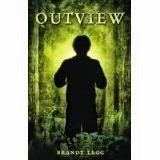
Massimo Marino
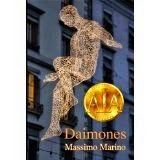
Kristen Duvall

So you 5... TAG!!!
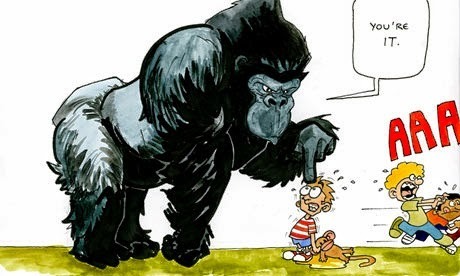
Published on June 10, 2014 02:27
June 3, 2014
CD Story Review #6: Fury's Child
 THE COVER OF ISSUE #1Richard Chizmar founded Cemetery Dance Magazine in 1988. It’s still in production today (now managed by author/ editor Brian James Freeman) & is considered one of the best horror mags of all time, having published and even discovered many of the genre's most famous and successful authors. This blog series is my attempt to read, review, and research every story CD has ever printed. As of Issue #70 (Sept. 2013), there are more than 500.
THE COVER OF ISSUE #1Richard Chizmar founded Cemetery Dance Magazine in 1988. It’s still in production today (now managed by author/ editor Brian James Freeman) & is considered one of the best horror mags of all time, having published and even discovered many of the genre's most famous and successful authors. This blog series is my attempt to read, review, and research every story CD has ever printed. As of Issue #70 (Sept. 2013), there are more than 500. STORY: “Fury's Child”
AUTHOR: David B. Silva
CD APPEARANCE: Issue #1 (Dec. 1988: Vol. 1, Iss. 1), story 6 of 12
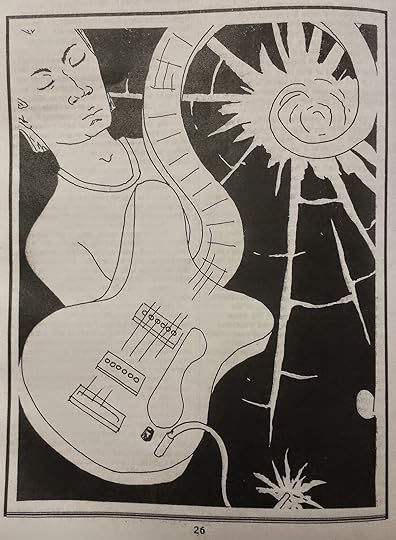 CD FEATURED A FULL-PAGE
CD FEATURED A FULL-PAGE PIC FOR "FURY'S CHILD"PLOT: Nick Fury is a musician. He plays guitar. But the story starts out telling us he should be dead.
The day Nick almost died he was working on a new riff in his basement when a thin sheen of leaking water makes contact with his guitar amp. Though he acted fast to unplug his equipment, Nick was nevertheless electrocuted and thrust into a surreal out-of-body experience. He first floats up through the ceiling, then through the roof of his house, then through the atmosphere, and eventually through the far reaches of the universe.
Nick sees a brilliant blue light at the end of a long tunnel and hears the most amazing music of his life. His mother (who is presumably already dead) then makes an appearance and speaks to him briefly before negating his belief that today is his day to die. The entire experience is much like we expect such a thing would be. It is- in a word- beautiful.
Then the story turns on us. A black, deformed hand pulls Nick's mother away from him and everything goes black. A moment later he wakes up in a hospital bed.
The next scene is at an undisclosed time later and Nick's (girl?)friend, Sadie, is begging him to come outside for just a few hours. He insists he needs to work on his new song, and we come to realize that Nick is obsessed with capturing the music he heard in the outer cosmos and that this has been going on for some time. Slowly & sadly, Sadie leaves & Nick barely notices.
Over the next 15 days, Nick composes non-stop, constantly frustrated as he attempts to recreate the music from his near-death experience. Little by little certain notes and chords click, and on the 15th day he finishes. He plays it through once to confirm it is the most important creative work of his career then invites Sadie over to hear it. She comes, listens, and cries at its beauty. It is further confirmation to Nick of what he has accomplished. Sadly, Sadie soon leaves and on her way home throws herself off the Golden Gate Bridge. The impression we get is that she could not handle the beauty of Nick's song.
The story comes to an end with Nick Fury coming to realize his brilliant song is dangerous. He wants to destroy the sheet music, but can't bring himself to do it. Instead, he locks it away and fends off calls from his manager about his lack of production. He loses fans, falls heavily to drug use, and appears to lose his sanity. The final paragraphs show Nick wondering once again what had reached forward and pulled his mother away as he stood at the threshold of death. He concludes only that Sadie now knows... and that if he picks up his guitar, his fingers would happily tell him.
REVIEW: 4 out of 5 stars.
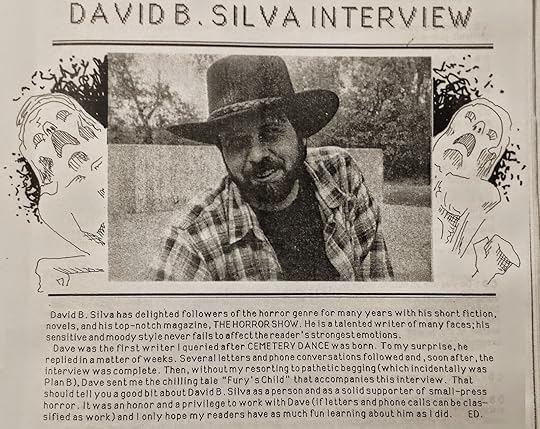 SILVA GOT BOTH HIS PIC & AN
SILVA GOT BOTH HIS PIC & AN INTERVIEW IN THE PREMIER ISSUE.
IF YOU CLICK TO ENLARGE &
READ HIS BLURB, YOU'LL
UNDERSTAND WHYI was oh-so-close to giving this one 5 stars. Indeed it probably deserves it. Silva's story is told far better than the others preceding it and leaves the reader with a much greater sense of wonder & appreciation than any CD story to date. However, it also had one thing missing... something that took me many minutes of consideration to nail down. That thing is a clear & distinct connection to the Horror genre. That's because this story is almost the antithesis of story 5 in this series of reviews... "Leg Man" was, if you recall, too gruesome for my tastes & lacked a certain finesse of story-telling. "Fury's Child" is, by comparison, too tame. I think it's only because Cemetery Dance billed itself from the outset as being a horror magazine that I had to make this distinction. In a standard fantasy magazine, this is easily 5 stars. Even in science-fiction it might have qualified. But for Horror... well, for Horror it is somewhat lacking in that key element to the genre that sets it apart from Fantasy or Sci-Fi: namely the ability to creep out the reader in some fashion. The only genuine creepiness is the vague suggestion that the blackened hand which took his mother was Nick's own... it was, after all, the contact point of his electrocution.
What really matters in this story, however, is the overwhelming ethereal feel Silva's words give readers. The description of what Nick Fury has gone through... the process by which he goes about discovering his song... the lingering image of his need to play the song again at the risk of his own life... all are- in that same, perfect word- beautiful.
Yet as a writer I must ask myself why Silva's images & concepts are the kind that stick. Allow me to quote my favorite passage from this story in order to explain what I think I've come to understand:
"Later, as he closed the basement door behind her, Nick smiled and slapped an open palm against the cinder-block wall. He had done it." This simple motion- this slapping of one's hand against a wall in exasperated contentedness- is what makes Silva a great writer. He doesn't push this moment in our faces. He doesn't feel the need to explain it. He merely shows us his character in the throes of a specific emotion and trusts we will get it. We do, and accuracy of what it looks like combined with his trust is- you guessed it- a beautiful thing.
Regardless of the lack of the elusive 5th star, Silva has impressed me. I look forward to more of his works and to what he can do when he decides to actually prickle my skin.
Published on June 03, 2014 17:44
May 14, 2014
Torchwood: A Review
 THE TORCHWOOD TEAM:
THE TORCHWOOD TEAM:GWEN, OWEN, JACK, IANTO, & TOSHIKOI am utterly… blown… away.
A spin-off show I thought was merely OK or even cheesy just rocked my world.
But I am also broken. Fractured. As dismantled as the very characters themselves.
This is among the most powerful writing I've ever seen.
And it is called Torchwood.
As mentioned above, “Torchwood” is a television show. It features 4 seasons of hour-long episodes that is a spin-off of the illustrious “Doctor Who”. In it, Captain Jack Harkness is our overly charismatic protagonist. He and his little team (called the Torchwood Institute) routinely hunt down and deal with aliens in and around the Cardiff, UK area. Most of those aliens are hostile and are either killed, returned to whence they came, or subdued. Some rare benign aliens are given aid. Chief among the characters’ quirks (& the center of the show’s best moments of intrigue) is Captain Jack himself, stolen directly from Doctor Who and utilized to his fullest extent. You see, Captain Jack cannot die.
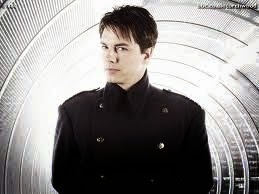 CAPTAIN JACK HARKNESSOr to be more precise, he cannot stay dead. In truth he dies all the time (and in one memorable episode near the very end of season 2 we learn this has been the case at least 1,000 times) but always resurrects. There are the inevitable scenes where Jack is murdered only to reanimate minutes later (much to the surprise of the overconfident trigger-puller), and henceforth save the day. But the show doesn't stop at these obvious cliches. Jack’s history is sometimes given center stage in a manner that leaves us not exactly near tears, but certainly empathetic to the woes of any man who has made a mistake and suffers the act of living through it.
CAPTAIN JACK HARKNESSOr to be more precise, he cannot stay dead. In truth he dies all the time (and in one memorable episode near the very end of season 2 we learn this has been the case at least 1,000 times) but always resurrects. There are the inevitable scenes where Jack is murdered only to reanimate minutes later (much to the surprise of the overconfident trigger-puller), and henceforth save the day. But the show doesn't stop at these obvious cliches. Jack’s history is sometimes given center stage in a manner that leaves us not exactly near tears, but certainly empathetic to the woes of any man who has made a mistake and suffers the act of living through it. And Jack, of course, has lived for hundreds of years. Perhaps thousands. Fans of "Doctor Who" already know this entire show is only the beginning of his amazing journey through life.
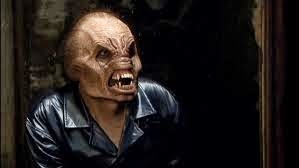 THIS IS A WEEVIL, A COMMON ALIEN THAT
THIS IS A WEEVIL, A COMMON ALIEN THATLIVES MAINLY IN THE SEWERS OF CARDIFFAs I said before, I first thought this show to be mediocre at best, with moments of intrigue worth sitting through the worst bits. However things picked up a bit about halfway through season 2 when a secondary character attained his own unique version of life-everlasting. You’ll be happy to know I won’t be “that guy” in this blog who ruins the fun for you by revealing too much (spoilers!), but I feel safe enough to tell you that the season 2 finale was genuinely amazing. In fact, it bordered on *literally* amazing. Take that in for a bit. I was damn-near actually amazed at what I had seen. And I've seen and read a lot of good Sci-Fi stories. Therefore, I hereby solemnly promise that if you can sit through the doldrums of season 1 (so as to gain the relevant back story) you will certainly be rewarded by the overall story presented in season 2.
And then there is season 3, the very reason for my spontaneous blog post this late evening.
It is a mere 5 episodes in length- clearly some kind of salvaging of a contract gone awry- but each one plays like 2 or 3. More importantly, this collective miniseries begins with a true bang and only increases in tension, moments of zen, heart-wrenchers, and scenes worthy of epic praise with each passing minute. For the overall show I have but one mid-sized season to go now, and I am already content with what I've seen. Season 4 could suck giant, hairy wildebeest balls for all I care… I am already more than satisfied, entertained, and educated as both viewer and author alike. Bravo, Torchwood writers. Bravo.
Now then, on my actual (if not elusive) analysis of Torchwood’s awe-inspiring third season...
 INSIDE THAT TANK IS THE EVIL ALIEN OF SEASON 3
INSIDE THAT TANK IS THE EVIL ALIEN OF SEASON 3THEY ARE CALLED ONLY "THE 456", NAMED AFTER
THE RADIO FREQUENCY WHERE THEIR MESSAGE WAS
FIRST DISCOVERED. ALSO INSIDE IS THE POISON IT BREATHES.Episode 1 concludes with an “Are you fucking kidding me?!” game-changer. Episode 2 raises the stakes and brings down the hammer, reminding us that Science-Fiction can tackle some seriously important shit, and I’m not talking about theoretical physics… I’m talking about the very questions that define humanity. As if that wasn't impressive enough, episode 3 takes it even further, almost laughing at the simplicity of the opening duo, flaunting in our faces the notion that our imaginations are our own worst enemies. Indeed seeing our greatest fears brought to life with faces and names and stories and pasts is oh-so-much-more devastating. Episode 4 adds layer after layer of political intrigue without dowsing the action and mind-fucks we've already come to expect. There’s also more of that great back story we love to get, and boy does Jack Harkness have a memorable past. Finally, the season finale somehow manages the impossible task of completing nearly a full dozen story arcs, each with satisfying nods of approval from my author’s side even as my viewer side cursed the writers of the show and held back tears. To be honest, this was a fight I eventually lost.
As you have probably discerned, I am refraining from revealing many specific details of the show in my analysis (again, spoilers!) for the sole reason that I don’t believe in them when the story matters. Instead, I am attempting to write an honest reaction to the levels of emotion and raw entertainment I have experienced, all in the hope that you will hop on over to Netflix and follow in my footsteps. Nevertheless, I feel a basic description is in order. I will therefore steal the Netflix single-sentence description blurbs and allow your imagination and curiosity to begin overflowing. They are as follows:
Torchwood: Season 3, Episode 1. “Children of Earth: Day One” An ordinary day becomes one of terror, as every child in the world stops and delivers a message to all the governments of Earth: “We are coming”.
Torchwood: Season 3, Episode 2. “Children of Earth: Day Two” Members of the [Torchwood] team are hunted down, Britain risks becoming a rogue state, and only one person holds the key to Torchwood’s salvation.
Torchwood: Season 3, Episode 3. “Children of Earth: Day Three” The eyes of the world turn to Britain, and members of Torchwood must battle to protect their own families as the fight gets personal.
Torchwood: Season 3, Episode 4. “Children of Earth: Day Four” Torchwood finally learns the truth and everything now pivots around one man. Old allegiances are destroyed and true intentions are revealed.
Torchwood: Season 3, Episode 5. “Children of Earth: Day Five” As violence erupts and anarchy reigns, an ordinary housing estate becomes a battleground where the future will be decided. Torchwood is defenseless.
Overall I cannot yet fairly give this show a rating since I’m not technically done, but for individual seasons I’d rank them as follows:
Season 1: 3 of 5 stars. Considering the potential they had to work with by stealing one of Doctor Who’s greatest companions, this felt like there could have been more done here. It’s a fun show, though, and one I was happy to put on each evening after my wife falls asleep watching our shared viewing experiences. :D
 THE OFFICIAL TORCHWOOD LOGO, VISIBLE ON
THE OFFICIAL TORCHWOOD LOGO, VISIBLE ONVARIOUS OFFICE WINDOWS, DOCUMENTS, AND
GADGETS THROUGHOUT THE SHOW.
IT'S ALSO ON MY NEWEST T-SHIRT. :) Season 2: 5 of 5 stars, though the first half was only a 4. As I already explained, things really kick into gear when a secondary character has his life altered in a meaningful and permanent way. This storyline is carried through to the end of the season even while Captain Jack’s own back story is filled in, much to our simultaneous satisfaction and frustration. Also, there's that season finale to watch out for. Yowzer.
Season 3: 5 of 5 stars. Can I change the rules and make it out of 10 stars then give this season a 12 please? I am rarely surprised by a turn that a storyline takes, unless I’m both surprised and annoyed by poor writing and/or cheap answers to important questions. This season/ miniseries continued to take me places I didn't expect, yet I appreciated and loved every minute of it. Example: Far too often the climax of a story (in this case I’m referring to that of the full-season story arc) is predictable. I’m not saying I’m saddened the evil aliens were vanquished thanks to Captain Jack Harkness’ flare for the dramatic… I’m saying each of the characters behaved as they should even though none of them was in their comfort zone or following their normal methods of problem-solving. I love it when characters are forced to do new things but still act in a manner befitting their identities. It’s not easy to do, and season 3 can safely add this accolade to their wall of shiny medals.
Published on May 14, 2014 23:47



